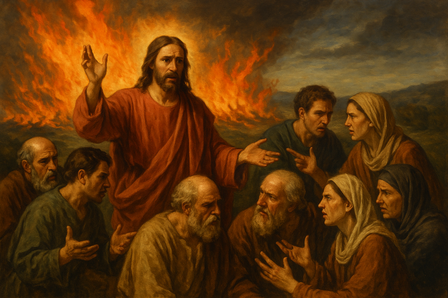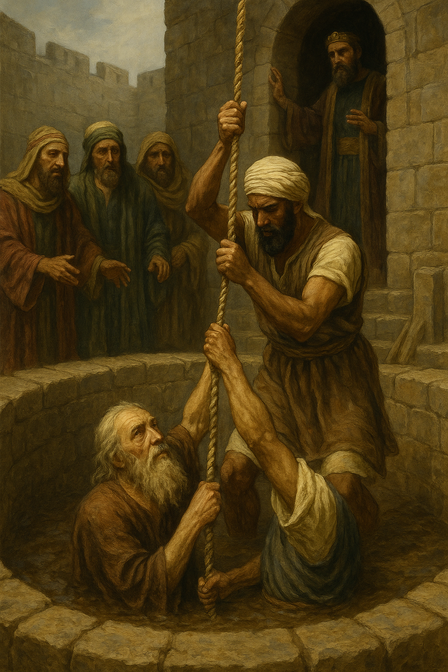
Jesus said to his disciples: ‘I have come to bring fire to the earth, and how I wish it were blazing already! There is a baptism I must still receive, and how great is my distress till it is over!
‘Do you suppose that I am here to bring peace on earth? No, I tell you, but rather division. For from now on a household of five will be divided: three against two and two against three; the father divided against the son, son against father, mother against daughter, daughter against mother, mother-in-law against daughter-in-law, daughter-in-law against mother-in-law.’

Today we read the Gospel according to Luke, the chapter number twelfth. Jesus Christ is talking about His mission. Among the words of our Master there is one sentence, which can make us a bit scary. Jesus Christ says that he came to bring the division between our relatives and families.
The father shall be divided against the son, the mother against the daughter, the mother-in-law against the daughter in law. Indeed, does Jesus encourage us to hate our families? Does He call us for revolution?
It was a time, in the XX century, when many people in South America understood the words of Christ inappropriately, and they tried to proclaim the God’s words with guns in their hands. It was a typical revolution of the Marxist philosophy. Soldiers and priest converted people with violence and fear. They thought it would spread the Gospel among the people of Latin America. This event received the name “liberation theology”. This philosophy had more political than spiritual core.
Of course, Jesus was a Revolutionist, He changed many things from the Old Testament, but His main will was to bring back the real dignity of a man.
One example, which is forgotten by many, Christ made treated equally man and woman. Any other religion on earth does not treat both sexes in exactly the same way.
For sure, so many families are dived because of faith. So often people must choose between the family and God, because of so many different priorities.
The thesis of Jesus Christ that came to bring the fire and division is a question: who in the first place is in your life?
If you choose me, you have to be ready that you might suffer from hatred and the lack of understanding from your father, mother, son or daughter, because those people have no place for God.
The Gospel of Christ teaches us that sometimes we must find heroism in ourselves, to stand on the side of God.
This is very difficult: staying between God and people which are close to us, but this is the evangelical radicalism.
I know one story from my original diocese in Poland. There is a priest, who comes from a typical family. The interesting fact is that his father was a policeman during the communist time. Those people, as members of the totalitarian system, were against to the Church, and concerned the Catholic Church in Poland, as their biggest enemy.
When the the son of that policeman said: I am going to be a priest. The reaction was terrible. The father said, no you will never be a priest until I am still alive.
The determination of that young man was great, despite of the resistance of the father; he joined the seminary and was ordinated to the priesthood. Using the words of Jesus, he was dived against his father.
The world knows many stories like that. Very often we must make some radical decision, even for the price of hatred in our families.
But Jesus says, " But the one who perseveres to the end will be saved". Amen.

Jezus powiedział do swoich uczniów: "Przyszedłem ogień rzucić na ziemię i jakże pragnę, ażeby już zapłonął. Chrzest mam przyjąć, i jakiej doznaję udręki, aż się to stanie. Czy myślicie, że przyszedłem dać ziemi pokój? Nie, powiadam wam, lecz rozłam. Odtąd bowiem pięcioro będzie podzielonych w jednym domu: troje stanie przeciw dwojgu, a dwoje przeciw trojgu; ojciec przeciw synowi, a syn przeciw ojcu; matka przeciw córce, a córka przeciw matce; teściowa przeciw synowej, a synowa przeciw teściowej".
Dziś czytamy Ewangelię według św. Łukasza, rozdział dwunasty. Jezus Chrystus mówi o swojej misji. Wśród słów naszego Mistrza znajduje się jedno zdanie, które może nas trochę przestraszyć. Jezus Chrystus mówi, że przyszedł, aby przynieść podział między krewnymi i rodzinami.
Ojciec będzie podzielony przeciwko synowi, matka przeciwko córce, teściowa przeciwko synowej. Czy Jezus zachęca nas, byśmy nienawidzili naszych rodzin? Czy wzywa nas do rewolucji?
Był czas, w XX wieku, kiedy wielu ludzi w Ameryce Południowej niewłaściwie rozumiało słowa Chrystusa i próbowali głosić Boże słowa z bronią w rękach. To była typowa rewolucja inspirowana filozofią marksistowską. Żołnierze i księża nawracali ludzi przy użyciu przemocy i strachu. Myśleli, że w ten sposób rozprzestrzenią Ewangelię wśród mieszkańców Ameryki Łacińskiej. To wydarzenie otrzymało nazwę „teologia wyzwolenia”, która miała bardziej polityczne niż duchowe podstawy.
Oczywiście Jezus był rewolucjonistą, zmienił wiele rzeczy ze Starego Testamentu, ale jego głównym zamiarem było przywrócenie prawdziwej godności człowieka.
Jednym przykładem, o którym wielu zapomina, jest to, że Chrystus traktował mężczyznę i kobietę jednakowo. Żadna inna religia na świecie nie traktuje obu płci w dokładnie ten sam sposób.
Z pewnością wiele rodzin jest podzielonych z powodu wiary. Często ludzie muszą wybierać pomiędzy rodziną a Bogiem, z powodu różnych priorytetów.
Teza Jezusa Chrystusa, że przyszedł przynieść ogień i podział, jest pytaniem: kto jest na pierwszym miejscu w Twoim życiu?
Jeśli wybierzesz mnie, musisz być gotowy na to, że możesz cierpieć z powodu nienawiści i braku zrozumienia ze strony ojca, matki, syna czy córki, ponieważ ci ludzie nie mają miejsca dla Boga.
Ewangelia Chrystusa uczy nas, że czasem musimy odnaleźć w sobie heroizm, by stanąć po stronie Boga.
To jest bardzo trudne: stać pomiędzy Bogiem a bliskimi nam ludźmi, ale to jest radykalizm ewangeliczny.
Znam jedną historię z mojej rodzinnej diecezji w Polsce. Jest tam ksiądz, który pochodzi z typowej rodziny. Ciekawym faktem jest to, że jego ojciec był policjantem w czasach komunistycznych. Ci ludzie, jako członkowie systemu totalitarnego, byli przeciwni Kościołowi i uważali Kościół katolicki w Polsce za swojego największego wroga.
Kiedy syn tego policjanta powiedział: „Zostanę księdzem”, reakcja była okropna. Ojciec powiedział: „Nie, nigdy nie będziesz księdzem, dopóki żyję”.
Determinacja tego młodego człowieka była ogromna — mimo sprzeciwu ojca wstąpił do seminarium i został wyświęcony na kapłana. Używając słów Jezusa, został podzielony przeciwko ojcu.
Świat zna wiele takich historii. Bardzo często musimy podejmować radykalne decyzje, nawet za cenę nienawiści w rodzinie.
Ale Jezus mówi: „Lecz kto wytrwa do końca, ten będzie zbawiony”. Amen.
Add comment
Comments